RQF Unit 9: Entrepreneurship & Small Business Management - FSB
VerifiedAdded on 2019/12/18
|21
|5261
|28
Report
AI Summary
This report provides an overview of entrepreneurship and small business management, focusing on various types of entrepreneurial ventures such as sole traders, public limited companies, partnerships, and franchises. It discusses the similarities and differences between private, public, and social enterprises, highlighting the roles and characteristics of micro, small, and medium-sized organizations. The report examines the scope, development, and growth of entrepreneurship, emphasizing its impact on the economy at local, regional, national, and international levels. It also explores the importance of small businesses and start-ups in fostering economic growth and social development. This document is available on Desklib, a platform offering a wealth of study resources for students.

Entrepreneurship and
Small Business
Management
Small Business
Management
Paraphrase This Document
Need a fresh take? Get an instant paraphrase of this document with our AI Paraphraser

Page 2 of 21
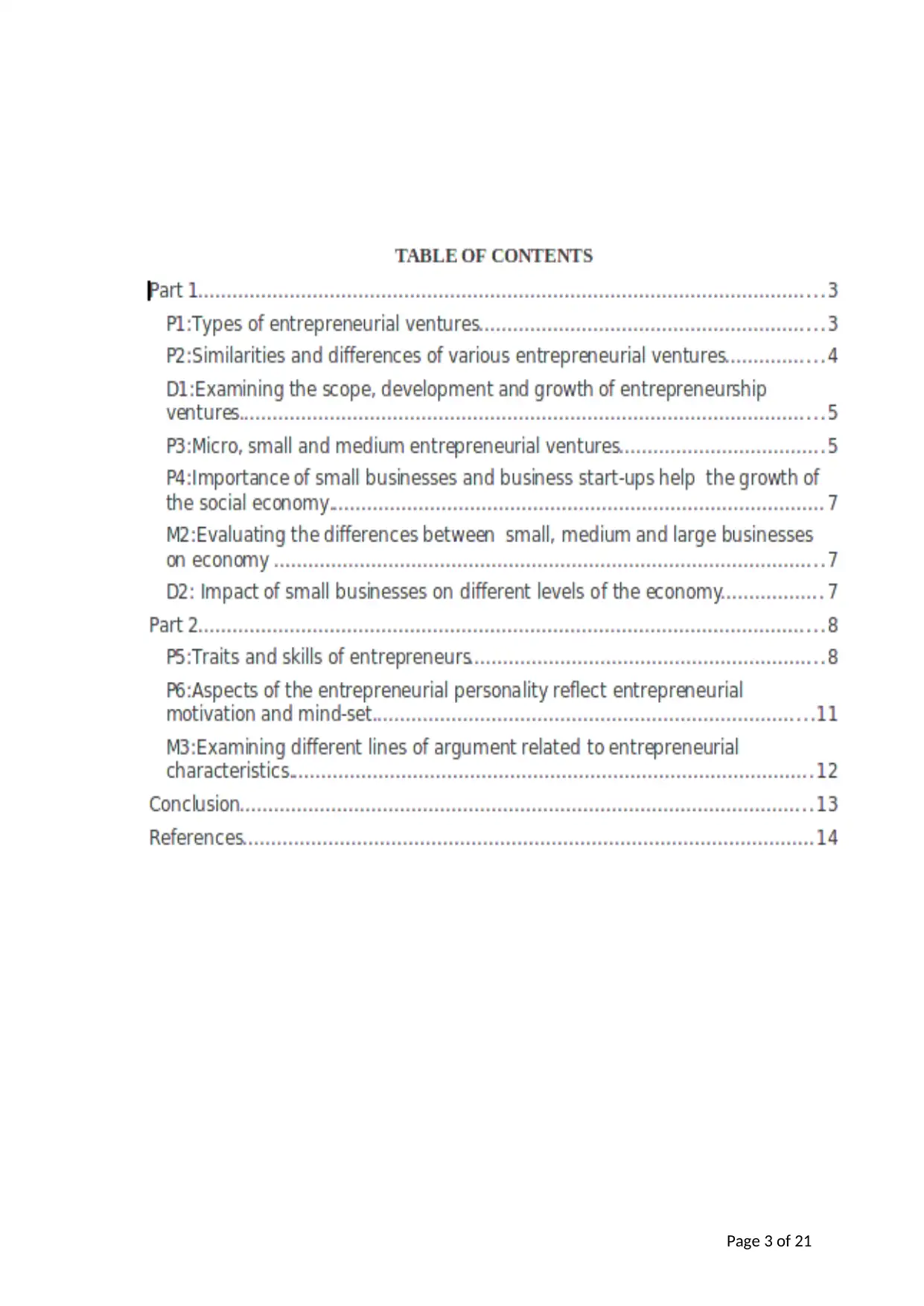
Page 3 of 21
⊘ This is a preview!⊘
Do you want full access?
Subscribe today to unlock all pages.

Trusted by 1+ million students worldwide
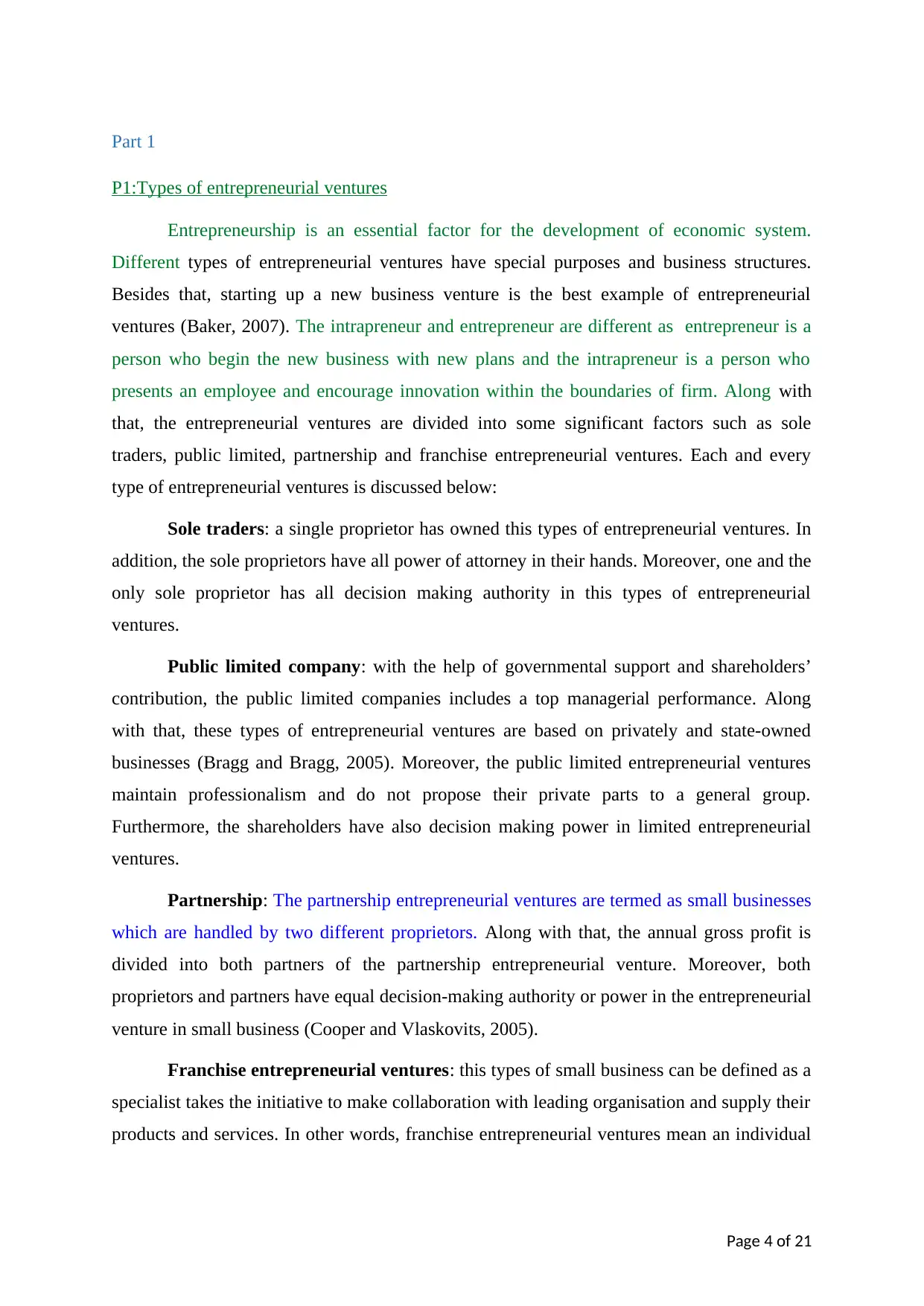
Part 1
P1:Types of entrepreneurial ventures
Entrepreneurship is an essential factor for the development of economic system.
Different types of entrepreneurial ventures have special purposes and business structures.
Besides that, starting up a new business venture is the best example of entrepreneurial
ventures (Baker, 2007). The intrapreneur and entrepreneur are different as entrepreneur is a
person who begin the new business with new plans and the intrapreneur is a person who
presents an employee and encourage innovation within the boundaries of firm. Along with
that, the entrepreneurial ventures are divided into some significant factors such as sole
traders, public limited, partnership and franchise entrepreneurial ventures. Each and every
type of entrepreneurial ventures is discussed below:
Sole traders: a single proprietor has owned this types of entrepreneurial ventures. In
addition, the sole proprietors have all power of attorney in their hands. Moreover, one and the
only sole proprietor has all decision making authority in this types of entrepreneurial
ventures.
Public limited company: with the help of governmental support and shareholders’
contribution, the public limited companies includes a top managerial performance. Along
with that, these types of entrepreneurial ventures are based on privately and state-owned
businesses (Bragg and Bragg, 2005). Moreover, the public limited entrepreneurial ventures
maintain professionalism and do not propose their private parts to a general group.
Furthermore, the shareholders have also decision making power in limited entrepreneurial
ventures.
Partnership: The partnership entrepreneurial ventures are termed as small businesses
which are handled by two different proprietors. Along with that, the annual gross profit is
divided into both partners of the partnership entrepreneurial venture. Moreover, both
proprietors and partners have equal decision-making authority or power in the entrepreneurial
venture in small business (Cooper and Vlaskovits, 2005).
Franchise entrepreneurial ventures: this types of small business can be defined as a
specialist takes the initiative to make collaboration with leading organisation and supply their
products and services. In other words, franchise entrepreneurial ventures mean an individual
Page 4 of 21
P1:Types of entrepreneurial ventures
Entrepreneurship is an essential factor for the development of economic system.
Different types of entrepreneurial ventures have special purposes and business structures.
Besides that, starting up a new business venture is the best example of entrepreneurial
ventures (Baker, 2007). The intrapreneur and entrepreneur are different as entrepreneur is a
person who begin the new business with new plans and the intrapreneur is a person who
presents an employee and encourage innovation within the boundaries of firm. Along with
that, the entrepreneurial ventures are divided into some significant factors such as sole
traders, public limited, partnership and franchise entrepreneurial ventures. Each and every
type of entrepreneurial ventures is discussed below:
Sole traders: a single proprietor has owned this types of entrepreneurial ventures. In
addition, the sole proprietors have all power of attorney in their hands. Moreover, one and the
only sole proprietor has all decision making authority in this types of entrepreneurial
ventures.
Public limited company: with the help of governmental support and shareholders’
contribution, the public limited companies includes a top managerial performance. Along
with that, these types of entrepreneurial ventures are based on privately and state-owned
businesses (Bragg and Bragg, 2005). Moreover, the public limited entrepreneurial ventures
maintain professionalism and do not propose their private parts to a general group.
Furthermore, the shareholders have also decision making power in limited entrepreneurial
ventures.
Partnership: The partnership entrepreneurial ventures are termed as small businesses
which are handled by two different proprietors. Along with that, the annual gross profit is
divided into both partners of the partnership entrepreneurial venture. Moreover, both
proprietors and partners have equal decision-making authority or power in the entrepreneurial
venture in small business (Cooper and Vlaskovits, 2005).
Franchise entrepreneurial ventures: this types of small business can be defined as a
specialist takes the initiative to make collaboration with leading organisation and supply their
products and services. In other words, franchise entrepreneurial ventures mean an individual
Page 4 of 21
Paraphrase This Document
Need a fresh take? Get an instant paraphrase of this document with our AI Paraphraser
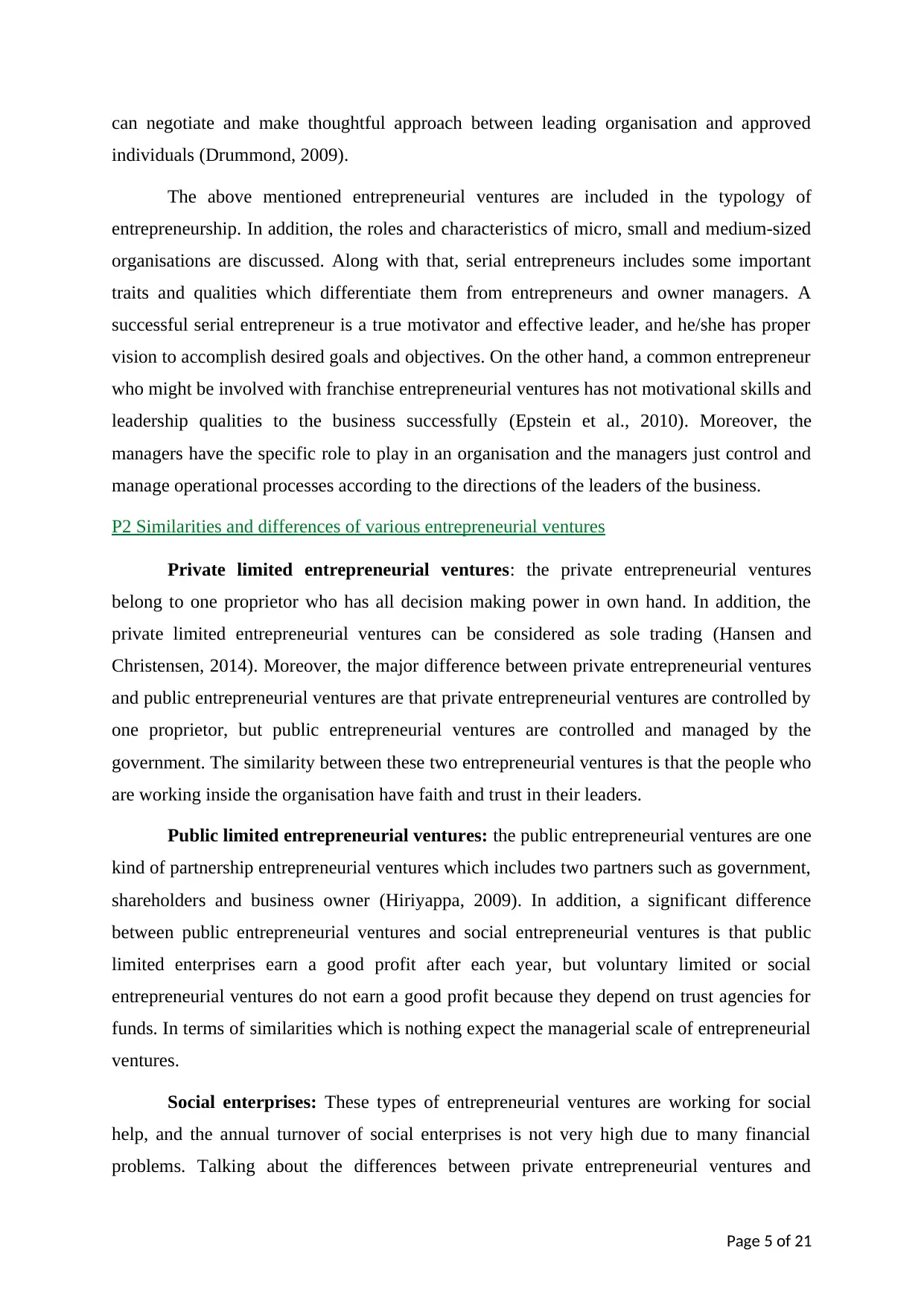
can negotiate and make thoughtful approach between leading organisation and approved
individuals (Drummond, 2009).
The above mentioned entrepreneurial ventures are included in the typology of
entrepreneurship. In addition, the roles and characteristics of micro, small and medium-sized
organisations are discussed. Along with that, serial entrepreneurs includes some important
traits and qualities which differentiate them from entrepreneurs and owner managers. A
successful serial entrepreneur is a true motivator and effective leader, and he/she has proper
vision to accomplish desired goals and objectives. On the other hand, a common entrepreneur
who might be involved with franchise entrepreneurial ventures has not motivational skills and
leadership qualities to the business successfully (Epstein et al., 2010). Moreover, the
managers have the specific role to play in an organisation and the managers just control and
manage operational processes according to the directions of the leaders of the business.
P2 Similarities and differences of various entrepreneurial ventures
Private limited entrepreneurial ventures: the private entrepreneurial ventures
belong to one proprietor who has all decision making power in own hand. In addition, the
private limited entrepreneurial ventures can be considered as sole trading (Hansen and
Christensen, 2014). Moreover, the major difference between private entrepreneurial ventures
and public entrepreneurial ventures are that private entrepreneurial ventures are controlled by
one proprietor, but public entrepreneurial ventures are controlled and managed by the
government. The similarity between these two entrepreneurial ventures is that the people who
are working inside the organisation have faith and trust in their leaders.
Public limited entrepreneurial ventures: the public entrepreneurial ventures are one
kind of partnership entrepreneurial ventures which includes two partners such as government,
shareholders and business owner (Hiriyappa, 2009). In addition, a significant difference
between public entrepreneurial ventures and social entrepreneurial ventures is that public
limited enterprises earn a good profit after each year, but voluntary limited or social
entrepreneurial ventures do not earn a good profit because they depend on trust agencies for
funds. In terms of similarities which is nothing expect the managerial scale of entrepreneurial
ventures.
Social enterprises: These types of entrepreneurial ventures are working for social
help, and the annual turnover of social enterprises is not very high due to many financial
problems. Talking about the differences between private entrepreneurial ventures and
Page 5 of 21
individuals (Drummond, 2009).
The above mentioned entrepreneurial ventures are included in the typology of
entrepreneurship. In addition, the roles and characteristics of micro, small and medium-sized
organisations are discussed. Along with that, serial entrepreneurs includes some important
traits and qualities which differentiate them from entrepreneurs and owner managers. A
successful serial entrepreneur is a true motivator and effective leader, and he/she has proper
vision to accomplish desired goals and objectives. On the other hand, a common entrepreneur
who might be involved with franchise entrepreneurial ventures has not motivational skills and
leadership qualities to the business successfully (Epstein et al., 2010). Moreover, the
managers have the specific role to play in an organisation and the managers just control and
manage operational processes according to the directions of the leaders of the business.
P2 Similarities and differences of various entrepreneurial ventures
Private limited entrepreneurial ventures: the private entrepreneurial ventures
belong to one proprietor who has all decision making power in own hand. In addition, the
private limited entrepreneurial ventures can be considered as sole trading (Hansen and
Christensen, 2014). Moreover, the major difference between private entrepreneurial ventures
and public entrepreneurial ventures are that private entrepreneurial ventures are controlled by
one proprietor, but public entrepreneurial ventures are controlled and managed by the
government. The similarity between these two entrepreneurial ventures is that the people who
are working inside the organisation have faith and trust in their leaders.
Public limited entrepreneurial ventures: the public entrepreneurial ventures are one
kind of partnership entrepreneurial ventures which includes two partners such as government,
shareholders and business owner (Hiriyappa, 2009). In addition, a significant difference
between public entrepreneurial ventures and social entrepreneurial ventures is that public
limited enterprises earn a good profit after each year, but voluntary limited or social
entrepreneurial ventures do not earn a good profit because they depend on trust agencies for
funds. In terms of similarities which is nothing expect the managerial scale of entrepreneurial
ventures.
Social enterprises: These types of entrepreneurial ventures are working for social
help, and the annual turnover of social enterprises is not very high due to many financial
problems. Talking about the differences between private entrepreneurial ventures and
Page 5 of 21
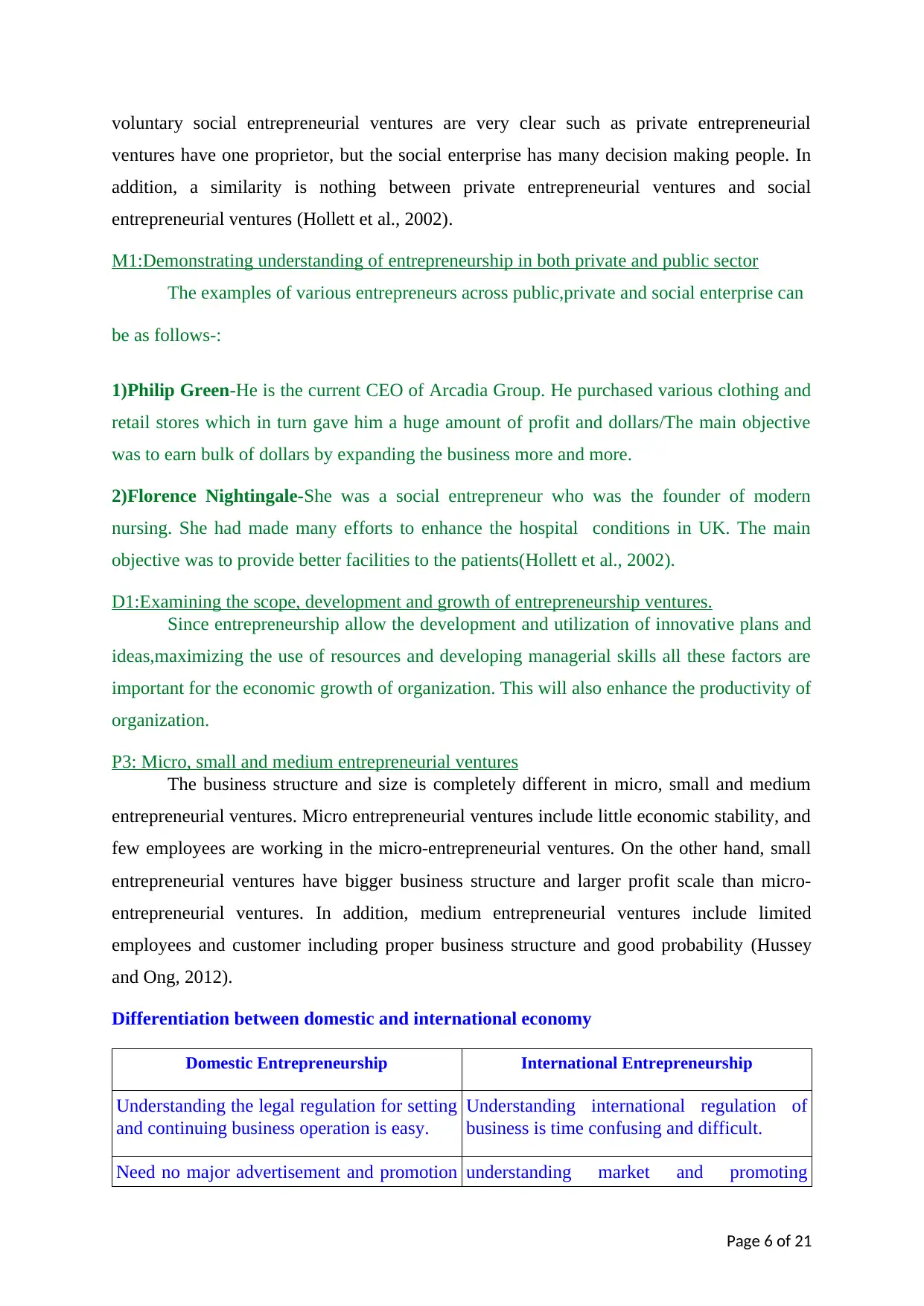
voluntary social entrepreneurial ventures are very clear such as private entrepreneurial
ventures have one proprietor, but the social enterprise has many decision making people. In
addition, a similarity is nothing between private entrepreneurial ventures and social
entrepreneurial ventures (Hollett et al., 2002).
M1:Demonstrating understanding of entrepreneurship in both private and public sector
The examples of various entrepreneurs across public,private and social enterprise can
be as follows-:
1)Philip Green-He is the current CEO of Arcadia Group. He purchased various clothing and
retail stores which in turn gave him a huge amount of profit and dollars/The main objective
was to earn bulk of dollars by expanding the business more and more.
2)Florence Nightingale-She was a social entrepreneur who was the founder of modern
nursing. She had made many efforts to enhance the hospital conditions in UK. The main
objective was to provide better facilities to the patients(Hollett et al., 2002).
D1:Examining the scope, development and growth of entrepreneurship ventures.
Since entrepreneurship allow the development and utilization of innovative plans and
ideas,maximizing the use of resources and developing managerial skills all these factors are
important for the economic growth of organization. This will also enhance the productivity of
organization.
P3: Micro, small and medium entrepreneurial ventures
The business structure and size is completely different in micro, small and medium
entrepreneurial ventures. Micro entrepreneurial ventures include little economic stability, and
few employees are working in the micro-entrepreneurial ventures. On the other hand, small
entrepreneurial ventures have bigger business structure and larger profit scale than micro-
entrepreneurial ventures. In addition, medium entrepreneurial ventures include limited
employees and customer including proper business structure and good probability (Hussey
and Ong, 2012).
Differentiation between domestic and international economy
Domestic Entrepreneurship International Entrepreneurship
Understanding the legal regulation for setting
and continuing business operation is easy.
Understanding international regulation of
business is time confusing and difficult.
Need no major advertisement and promotion understanding market and promoting
Page 6 of 21
ventures have one proprietor, but the social enterprise has many decision making people. In
addition, a similarity is nothing between private entrepreneurial ventures and social
entrepreneurial ventures (Hollett et al., 2002).
M1:Demonstrating understanding of entrepreneurship in both private and public sector
The examples of various entrepreneurs across public,private and social enterprise can
be as follows-:
1)Philip Green-He is the current CEO of Arcadia Group. He purchased various clothing and
retail stores which in turn gave him a huge amount of profit and dollars/The main objective
was to earn bulk of dollars by expanding the business more and more.
2)Florence Nightingale-She was a social entrepreneur who was the founder of modern
nursing. She had made many efforts to enhance the hospital conditions in UK. The main
objective was to provide better facilities to the patients(Hollett et al., 2002).
D1:Examining the scope, development and growth of entrepreneurship ventures.
Since entrepreneurship allow the development and utilization of innovative plans and
ideas,maximizing the use of resources and developing managerial skills all these factors are
important for the economic growth of organization. This will also enhance the productivity of
organization.
P3: Micro, small and medium entrepreneurial ventures
The business structure and size is completely different in micro, small and medium
entrepreneurial ventures. Micro entrepreneurial ventures include little economic stability, and
few employees are working in the micro-entrepreneurial ventures. On the other hand, small
entrepreneurial ventures have bigger business structure and larger profit scale than micro-
entrepreneurial ventures. In addition, medium entrepreneurial ventures include limited
employees and customer including proper business structure and good probability (Hussey
and Ong, 2012).
Differentiation between domestic and international economy
Domestic Entrepreneurship International Entrepreneurship
Understanding the legal regulation for setting
and continuing business operation is easy.
Understanding international regulation of
business is time confusing and difficult.
Need no major advertisement and promotion understanding market and promoting
Page 6 of 21
⊘ This is a preview!⊘
Do you want full access?
Subscribe today to unlock all pages.

Trusted by 1+ million students worldwide
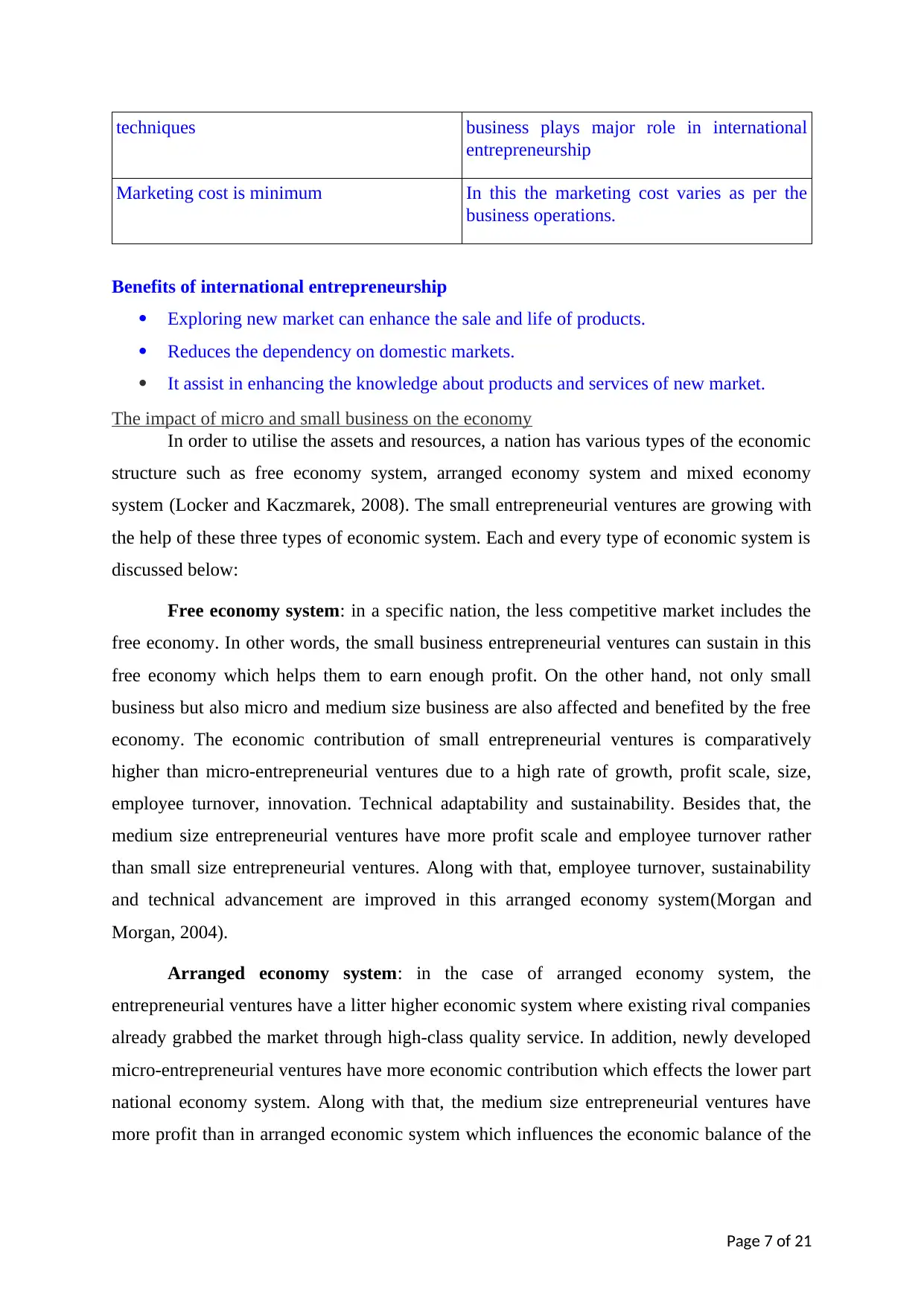
techniques business plays major role in international
entrepreneurship
Marketing cost is minimum In this the marketing cost varies as per the
business operations.
Benefits of international entrepreneurship
Exploring new market can enhance the sale and life of products.
Reduces the dependency on domestic markets.
It assist in enhancing the knowledge about products and services of new market.
The impact of micro and small business on the economy
In order to utilise the assets and resources, a nation has various types of the economic
structure such as free economy system, arranged economy system and mixed economy
system (Locker and Kaczmarek, 2008). The small entrepreneurial ventures are growing with
the help of these three types of economic system. Each and every type of economic system is
discussed below:
Free economy system: in a specific nation, the less competitive market includes the
free economy. In other words, the small business entrepreneurial ventures can sustain in this
free economy which helps them to earn enough profit. On the other hand, not only small
business but also micro and medium size business are also affected and benefited by the free
economy. The economic contribution of small entrepreneurial ventures is comparatively
higher than micro-entrepreneurial ventures due to a high rate of growth, profit scale, size,
employee turnover, innovation. Technical adaptability and sustainability. Besides that, the
medium size entrepreneurial ventures have more profit scale and employee turnover rather
than small size entrepreneurial ventures. Along with that, employee turnover, sustainability
and technical advancement are improved in this arranged economy system(Morgan and
Morgan, 2004).
Arranged economy system: in the case of arranged economy system, the
entrepreneurial ventures have a litter higher economic system where existing rival companies
already grabbed the market through high-class quality service. In addition, newly developed
micro-entrepreneurial ventures have more economic contribution which effects the lower part
national economy system. Along with that, the medium size entrepreneurial ventures have
more profit than in arranged economic system which influences the economic balance of the
Page 7 of 21
entrepreneurship
Marketing cost is minimum In this the marketing cost varies as per the
business operations.
Benefits of international entrepreneurship
Exploring new market can enhance the sale and life of products.
Reduces the dependency on domestic markets.
It assist in enhancing the knowledge about products and services of new market.
The impact of micro and small business on the economy
In order to utilise the assets and resources, a nation has various types of the economic
structure such as free economy system, arranged economy system and mixed economy
system (Locker and Kaczmarek, 2008). The small entrepreneurial ventures are growing with
the help of these three types of economic system. Each and every type of economic system is
discussed below:
Free economy system: in a specific nation, the less competitive market includes the
free economy. In other words, the small business entrepreneurial ventures can sustain in this
free economy which helps them to earn enough profit. On the other hand, not only small
business but also micro and medium size business are also affected and benefited by the free
economy. The economic contribution of small entrepreneurial ventures is comparatively
higher than micro-entrepreneurial ventures due to a high rate of growth, profit scale, size,
employee turnover, innovation. Technical adaptability and sustainability. Besides that, the
medium size entrepreneurial ventures have more profit scale and employee turnover rather
than small size entrepreneurial ventures. Along with that, employee turnover, sustainability
and technical advancement are improved in this arranged economy system(Morgan and
Morgan, 2004).
Arranged economy system: in the case of arranged economy system, the
entrepreneurial ventures have a litter higher economic system where existing rival companies
already grabbed the market through high-class quality service. In addition, newly developed
micro-entrepreneurial ventures have more economic contribution which effects the lower part
national economy system. Along with that, the medium size entrepreneurial ventures have
more profit than in arranged economic system which influences the economic balance of the
Page 7 of 21
Paraphrase This Document
Need a fresh take? Get an instant paraphrase of this document with our AI Paraphraser
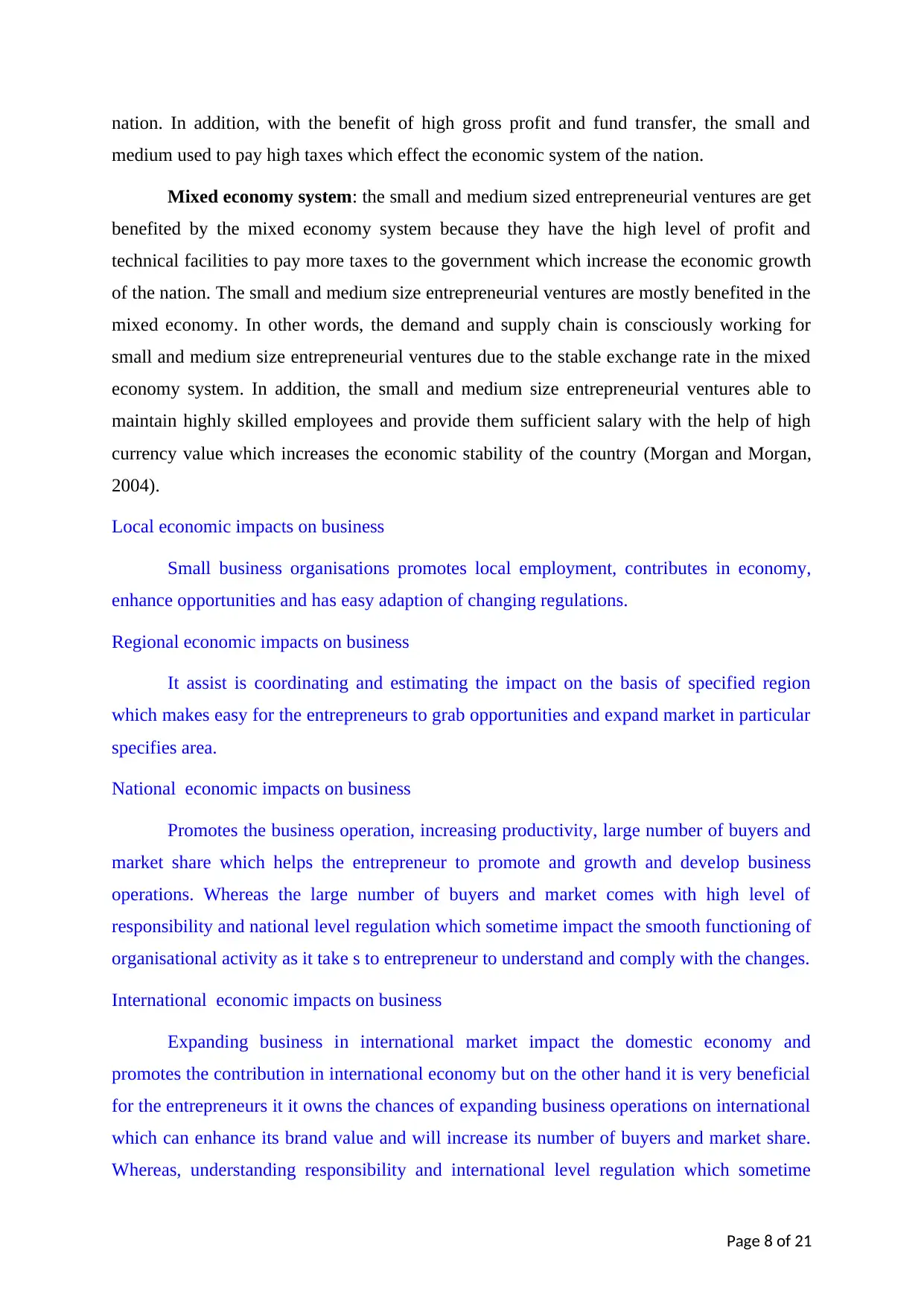
nation. In addition, with the benefit of high gross profit and fund transfer, the small and
medium used to pay high taxes which effect the economic system of the nation.
Mixed economy system: the small and medium sized entrepreneurial ventures are get
benefited by the mixed economy system because they have the high level of profit and
technical facilities to pay more taxes to the government which increase the economic growth
of the nation. The small and medium size entrepreneurial ventures are mostly benefited in the
mixed economy. In other words, the demand and supply chain is consciously working for
small and medium size entrepreneurial ventures due to the stable exchange rate in the mixed
economy system. In addition, the small and medium size entrepreneurial ventures able to
maintain highly skilled employees and provide them sufficient salary with the help of high
currency value which increases the economic stability of the country (Morgan and Morgan,
2004).
Local economic impacts on business
Small business organisations promotes local employment, contributes in economy,
enhance opportunities and has easy adaption of changing regulations.
Regional economic impacts on business
It assist is coordinating and estimating the impact on the basis of specified region
which makes easy for the entrepreneurs to grab opportunities and expand market in particular
specifies area.
National economic impacts on business
Promotes the business operation, increasing productivity, large number of buyers and
market share which helps the entrepreneur to promote and growth and develop business
operations. Whereas the large number of buyers and market comes with high level of
responsibility and national level regulation which sometime impact the smooth functioning of
organisational activity as it take s to entrepreneur to understand and comply with the changes.
International economic impacts on business
Expanding business in international market impact the domestic economy and
promotes the contribution in international economy but on the other hand it is very beneficial
for the entrepreneurs it it owns the chances of expanding business operations on international
which can enhance its brand value and will increase its number of buyers and market share.
Whereas, understanding responsibility and international level regulation which sometime
Page 8 of 21
medium used to pay high taxes which effect the economic system of the nation.
Mixed economy system: the small and medium sized entrepreneurial ventures are get
benefited by the mixed economy system because they have the high level of profit and
technical facilities to pay more taxes to the government which increase the economic growth
of the nation. The small and medium size entrepreneurial ventures are mostly benefited in the
mixed economy. In other words, the demand and supply chain is consciously working for
small and medium size entrepreneurial ventures due to the stable exchange rate in the mixed
economy system. In addition, the small and medium size entrepreneurial ventures able to
maintain highly skilled employees and provide them sufficient salary with the help of high
currency value which increases the economic stability of the country (Morgan and Morgan,
2004).
Local economic impacts on business
Small business organisations promotes local employment, contributes in economy,
enhance opportunities and has easy adaption of changing regulations.
Regional economic impacts on business
It assist is coordinating and estimating the impact on the basis of specified region
which makes easy for the entrepreneurs to grab opportunities and expand market in particular
specifies area.
National economic impacts on business
Promotes the business operation, increasing productivity, large number of buyers and
market share which helps the entrepreneur to promote and growth and develop business
operations. Whereas the large number of buyers and market comes with high level of
responsibility and national level regulation which sometime impact the smooth functioning of
organisational activity as it take s to entrepreneur to understand and comply with the changes.
International economic impacts on business
Expanding business in international market impact the domestic economy and
promotes the contribution in international economy but on the other hand it is very beneficial
for the entrepreneurs it it owns the chances of expanding business operations on international
which can enhance its brand value and will increase its number of buyers and market share.
Whereas, understanding responsibility and international level regulation which sometime
Page 8 of 21
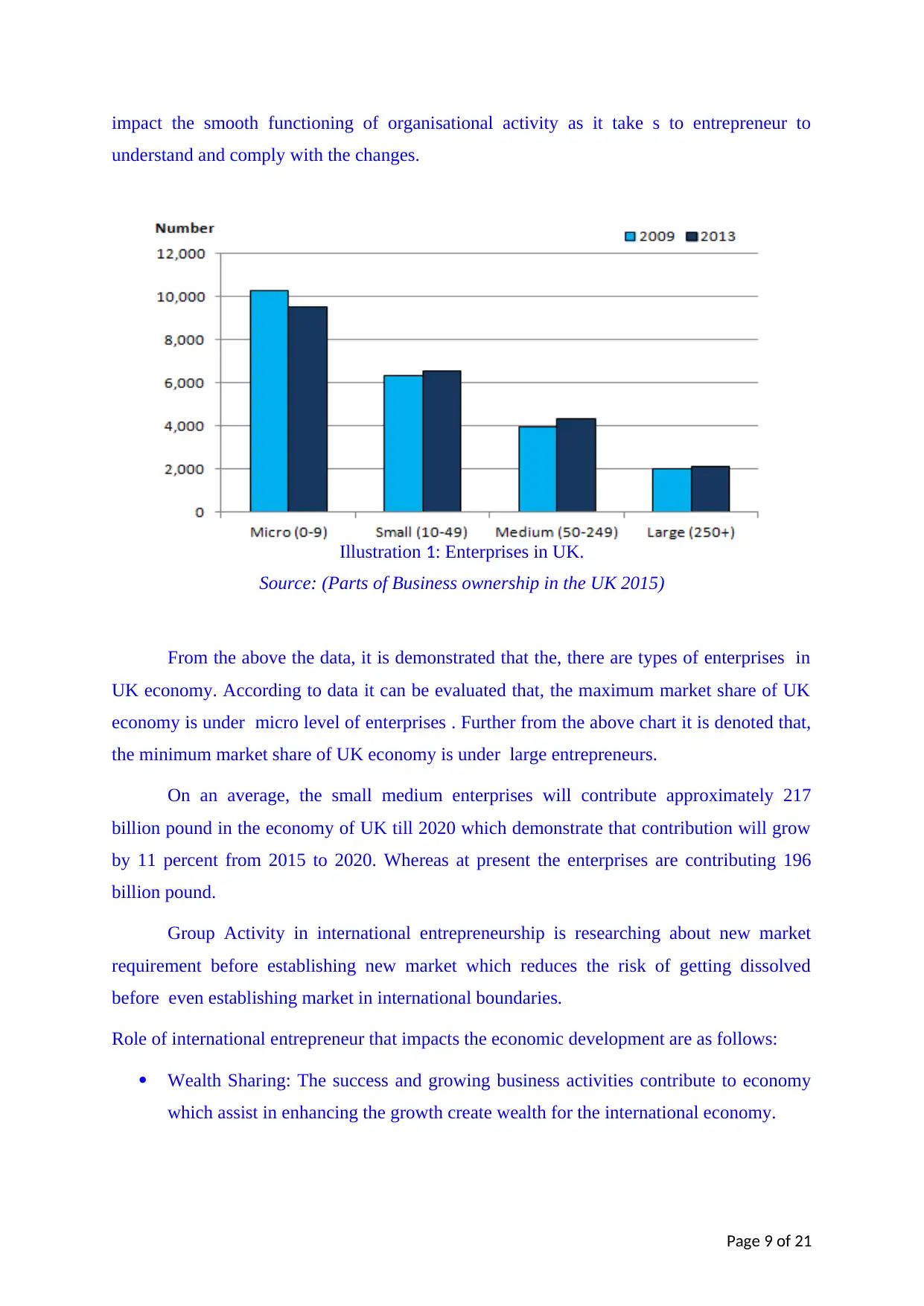
impact the smooth functioning of organisational activity as it take s to entrepreneur to
understand and comply with the changes.
From the above the data, it is demonstrated that the, there are types of enterprises in
UK economy. According to data it can be evaluated that, the maximum market share of UK
economy is under micro level of enterprises . Further from the above chart it is denoted that,
the minimum market share of UK economy is under large entrepreneurs.
On an average, the small medium enterprises will contribute approximately 217
billion pound in the economy of UK till 2020 which demonstrate that contribution will grow
by 11 percent from 2015 to 2020. Whereas at present the enterprises are contributing 196
billion pound.
Group Activity in international entrepreneurship is researching about new market
requirement before establishing new market which reduces the risk of getting dissolved
before even establishing market in international boundaries.
Role of international entrepreneur that impacts the economic development are as follows:
Wealth Sharing: The success and growing business activities contribute to economy
which assist in enhancing the growth create wealth for the international economy.
Page 9 of 21
Illustration 1: Enterprises in UK.
Source: (Parts of Business ownership in the UK 2015)
understand and comply with the changes.
From the above the data, it is demonstrated that the, there are types of enterprises in
UK economy. According to data it can be evaluated that, the maximum market share of UK
economy is under micro level of enterprises . Further from the above chart it is denoted that,
the minimum market share of UK economy is under large entrepreneurs.
On an average, the small medium enterprises will contribute approximately 217
billion pound in the economy of UK till 2020 which demonstrate that contribution will grow
by 11 percent from 2015 to 2020. Whereas at present the enterprises are contributing 196
billion pound.
Group Activity in international entrepreneurship is researching about new market
requirement before establishing new market which reduces the risk of getting dissolved
before even establishing market in international boundaries.
Role of international entrepreneur that impacts the economic development are as follows:
Wealth Sharing: The success and growing business activities contribute to economy
which assist in enhancing the growth create wealth for the international economy.
Page 9 of 21
Illustration 1: Enterprises in UK.
Source: (Parts of Business ownership in the UK 2015)
⊘ This is a preview!⊘
Do you want full access?
Subscribe today to unlock all pages.

Trusted by 1+ million students worldwide
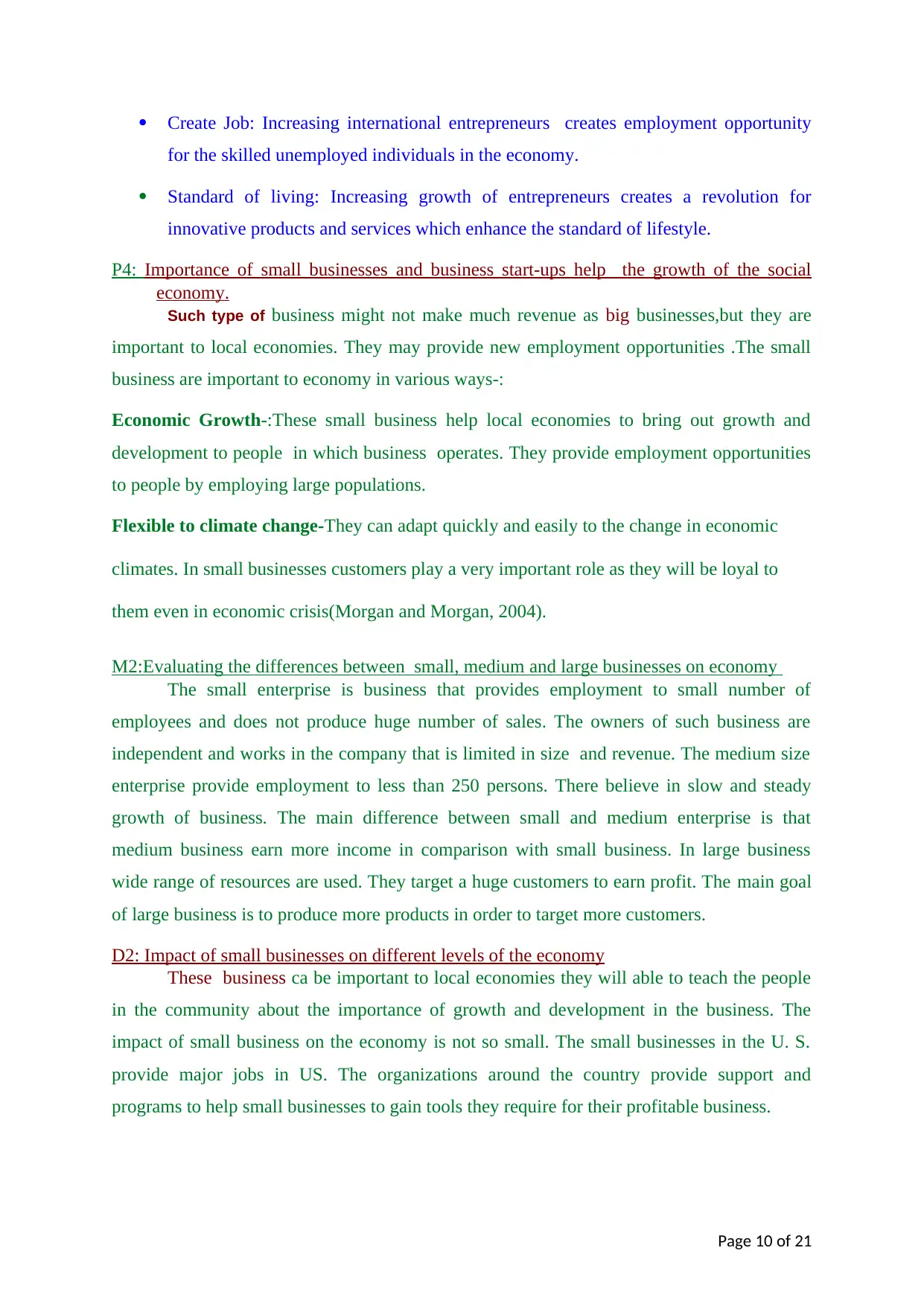
Create Job: Increasing international entrepreneurs creates employment opportunity
for the skilled unemployed individuals in the economy.
Standard of living: Increasing growth of entrepreneurs creates a revolution for
innovative products and services which enhance the standard of lifestyle.
P4: Importance of small businesses and business start-ups help the growth of the social
economy.
Such type of business might not make much revenue as big businesses,but they are
important to local economies. They may provide new employment opportunities .The small
business are important to economy in various ways-:
Economic Growth-:These small business help local economies to bring out growth and
development to people in which business operates. They provide employment opportunities
to people by employing large populations.
Flexible to climate change-They can adapt quickly and easily to the change in economic
climates. In small businesses customers play a very important role as they will be loyal to
them even in economic crisis(Morgan and Morgan, 2004).
M2:Evaluating the differences between small, medium and large businesses on economy
The small enterprise is business that provides employment to small number of
employees and does not produce huge number of sales. The owners of such business are
independent and works in the company that is limited in size and revenue. The medium size
enterprise provide employment to less than 250 persons. There believe in slow and steady
growth of business. The main difference between small and medium enterprise is that
medium business earn more income in comparison with small business. In large business
wide range of resources are used. They target a huge customers to earn profit. The main goal
of large business is to produce more products in order to target more customers.
D2: Impact of small businesses on different levels of the economy
These business ca be important to local economies they will able to teach the people
in the community about the importance of growth and development in the business. The
impact of small business on the economy is not so small. The small businesses in the U. S.
provide major jobs in US. The organizations around the country provide support and
programs to help small businesses to gain tools they require for their profitable business.
Page 10 of 21
for the skilled unemployed individuals in the economy.
Standard of living: Increasing growth of entrepreneurs creates a revolution for
innovative products and services which enhance the standard of lifestyle.
P4: Importance of small businesses and business start-ups help the growth of the social
economy.
Such type of business might not make much revenue as big businesses,but they are
important to local economies. They may provide new employment opportunities .The small
business are important to economy in various ways-:
Economic Growth-:These small business help local economies to bring out growth and
development to people in which business operates. They provide employment opportunities
to people by employing large populations.
Flexible to climate change-They can adapt quickly and easily to the change in economic
climates. In small businesses customers play a very important role as they will be loyal to
them even in economic crisis(Morgan and Morgan, 2004).
M2:Evaluating the differences between small, medium and large businesses on economy
The small enterprise is business that provides employment to small number of
employees and does not produce huge number of sales. The owners of such business are
independent and works in the company that is limited in size and revenue. The medium size
enterprise provide employment to less than 250 persons. There believe in slow and steady
growth of business. The main difference between small and medium enterprise is that
medium business earn more income in comparison with small business. In large business
wide range of resources are used. They target a huge customers to earn profit. The main goal
of large business is to produce more products in order to target more customers.
D2: Impact of small businesses on different levels of the economy
These business ca be important to local economies they will able to teach the people
in the community about the importance of growth and development in the business. The
impact of small business on the economy is not so small. The small businesses in the U. S.
provide major jobs in US. The organizations around the country provide support and
programs to help small businesses to gain tools they require for their profitable business.
Page 10 of 21
Paraphrase This Document
Need a fresh take? Get an instant paraphrase of this document with our AI Paraphraser

Page 11 of 21
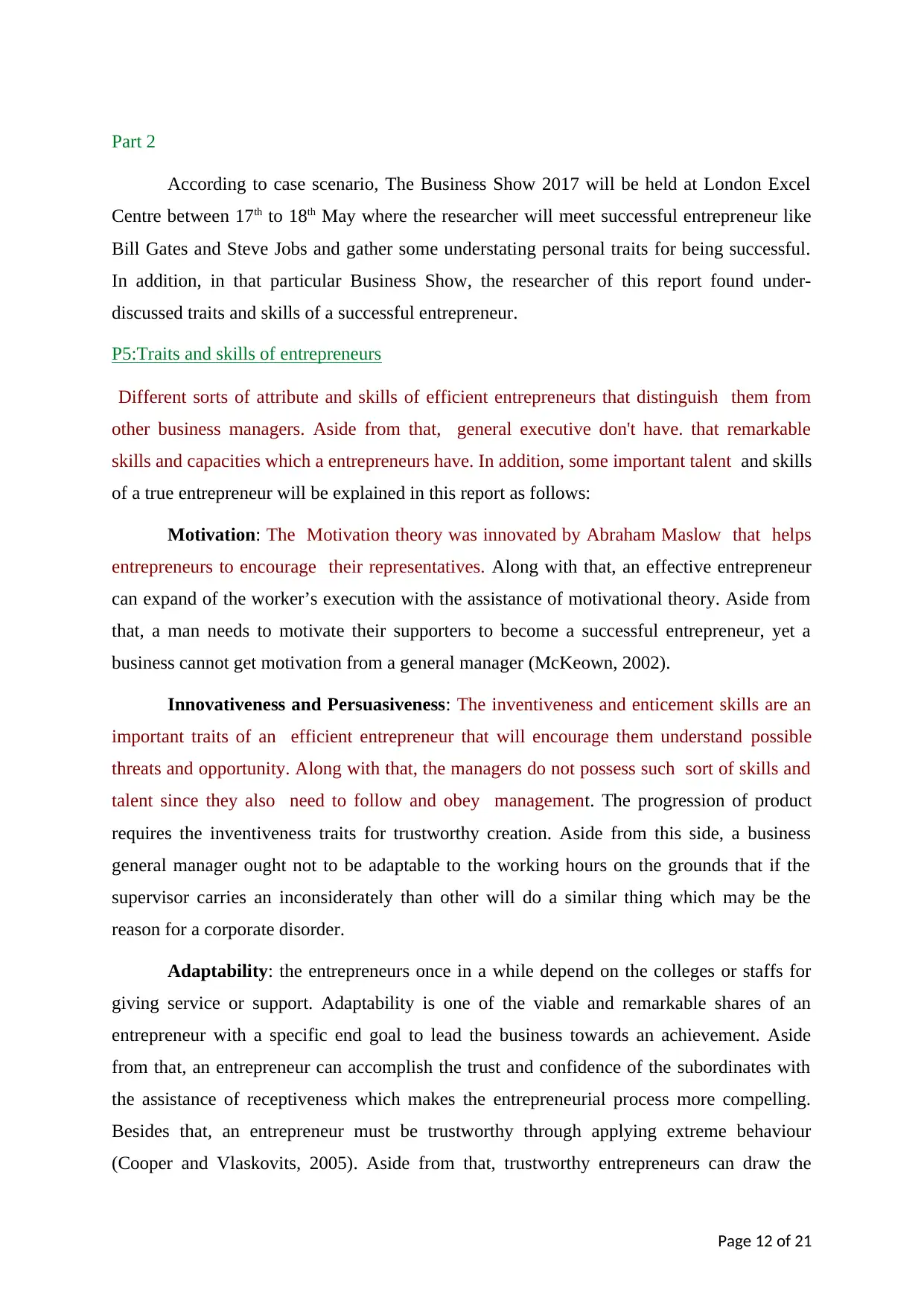
Part 2
According to case scenario, The Business Show 2017 will be held at London Excel
Centre between 17th to 18th May where the researcher will meet successful entrepreneur like
Bill Gates and Steve Jobs and gather some understating personal traits for being successful.
In addition, in that particular Business Show, the researcher of this report found under-
discussed traits and skills of a successful entrepreneur.
P5:Traits and skills of entrepreneurs
Different sorts of attribute and skills of efficient entrepreneurs that distinguish them from
other business managers. Aside from that, general executive don't have. that remarkable
skills and capacities which a entrepreneurs have. In addition, some important talent and skills
of a true entrepreneur will be explained in this report as follows:
Motivation: The Motivation theory was innovated by Abraham Maslow that helps
entrepreneurs to encourage their representatives. Along with that, an effective entrepreneur
can expand of the worker’s execution with the assistance of motivational theory. Aside from
that, a man needs to motivate their supporters to become a successful entrepreneur, yet a
business cannot get motivation from a general manager (McKeown, 2002).
Innovativeness and Persuasiveness: The inventiveness and enticement skills are an
important traits of an efficient entrepreneur that will encourage them understand possible
threats and opportunity. Along with that, the managers do not possess such sort of skills and
talent since they also need to follow and obey management. The progression of product
requires the inventiveness traits for trustworthy creation. Aside from this side, a business
general manager ought not to be adaptable to the working hours on the grounds that if the
supervisor carries an inconsiderately than other will do a similar thing which may be the
reason for a corporate disorder.
Adaptability: the entrepreneurs once in a while depend on the colleges or staffs for
giving service or support. Adaptability is one of the viable and remarkable shares of an
entrepreneur with a specific end goal to lead the business towards an achievement. Aside
from that, an entrepreneur can accomplish the trust and confidence of the subordinates with
the assistance of receptiveness which makes the entrepreneurial process more compelling.
Besides that, an entrepreneur must be trustworthy through applying extreme behaviour
(Cooper and Vlaskovits, 2005). Aside from that, trustworthy entrepreneurs can draw the
Page 12 of 21
According to case scenario, The Business Show 2017 will be held at London Excel
Centre between 17th to 18th May where the researcher will meet successful entrepreneur like
Bill Gates and Steve Jobs and gather some understating personal traits for being successful.
In addition, in that particular Business Show, the researcher of this report found under-
discussed traits and skills of a successful entrepreneur.
P5:Traits and skills of entrepreneurs
Different sorts of attribute and skills of efficient entrepreneurs that distinguish them from
other business managers. Aside from that, general executive don't have. that remarkable
skills and capacities which a entrepreneurs have. In addition, some important talent and skills
of a true entrepreneur will be explained in this report as follows:
Motivation: The Motivation theory was innovated by Abraham Maslow that helps
entrepreneurs to encourage their representatives. Along with that, an effective entrepreneur
can expand of the worker’s execution with the assistance of motivational theory. Aside from
that, a man needs to motivate their supporters to become a successful entrepreneur, yet a
business cannot get motivation from a general manager (McKeown, 2002).
Innovativeness and Persuasiveness: The inventiveness and enticement skills are an
important traits of an efficient entrepreneur that will encourage them understand possible
threats and opportunity. Along with that, the managers do not possess such sort of skills and
talent since they also need to follow and obey management. The progression of product
requires the inventiveness traits for trustworthy creation. Aside from this side, a business
general manager ought not to be adaptable to the working hours on the grounds that if the
supervisor carries an inconsiderately than other will do a similar thing which may be the
reason for a corporate disorder.
Adaptability: the entrepreneurs once in a while depend on the colleges or staffs for
giving service or support. Adaptability is one of the viable and remarkable shares of an
entrepreneur with a specific end goal to lead the business towards an achievement. Aside
from that, an entrepreneur can accomplish the trust and confidence of the subordinates with
the assistance of receptiveness which makes the entrepreneurial process more compelling.
Besides that, an entrepreneur must be trustworthy through applying extreme behaviour
(Cooper and Vlaskovits, 2005). Aside from that, trustworthy entrepreneurs can draw the
Page 12 of 21
⊘ This is a preview!⊘
Do you want full access?
Subscribe today to unlock all pages.

Trusted by 1+ million students worldwide
1 out of 21
Related Documents
Your All-in-One AI-Powered Toolkit for Academic Success.
+13062052269
info@desklib.com
Available 24*7 on WhatsApp / Email
![[object Object]](/_next/static/media/star-bottom.7253800d.svg)
Unlock your academic potential
Copyright © 2020–2025 A2Z Services. All Rights Reserved. Developed and managed by ZUCOL.





